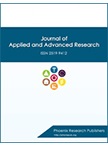Music and Health
DOI:
https://doi.org/10.21839/jaar.2017.v2i2.62Keywords:
anxiety, blood pressure, depression, music therapy.Abstract
Music therapy is the use of intervention to accomplish individual goals within a therapeutic relationship by a professional who has completed an approved music therapy programme. Music has several physiological effects including positive effects on mood, a reduction of anxiety, stress and a lowering of blood pressure. There are several types of music therapy. Music therapy procedures are structured as either receptive or active. Music therapy methods include music recreation, improvisation, composition, listening and receptive experience. In modern health care, music has several applications in the perioperative setting, neurology, family medicine, paediatrics, obstetrics, interventional procedures, the critical care unit, pain management, palliative care and cancer. Though it has some limitations, there is ample scientific evidence to support the beneficial use of music therapy as a low-cost therapy with no side effect in various clinical situations in current health care settings. This article describes the various applications of music in modern health care.





 .
.